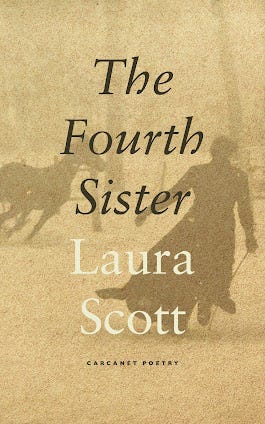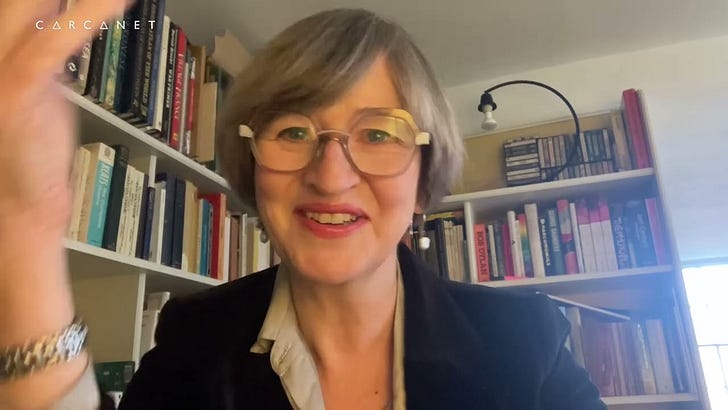The Fourth Sister: Laura Scott
This week's blog by Laura Scott, author of The Fourth Sister, which is published this month. Use code FEBBOOKS for 20% off and free UK P&P.

I want to introduce The Fourth Sister by praising indolence and whatever the opposite of clarity is – opacity, I suppose – because without these qualities the book wouldn’t exist. But before I do that I need to go back a bit, to that stage of getting a collection together where you spread the poems out in front of you and sit marooned in the middle of a sea of white pages. The longer you sit there, the more the patterns of black words start to look like different kinds of movement – the short blips and flights of words that rush across the page, the longer, slower-paced unfolding into quatrains or triplets, the tightrope balance of couplets or the square blocks that flirt with narrative prose.
I like this stage. For one thing, it’s the moment when the poems start to assert themselves, to insist on their own importance simply by virtue of there being so many of them: a lone poem can be pushed aside, but when they’re all there en masse, taking up so much space, you can’t ignore them, not if you want to walk across the floor again without having to tread on them. And I also like it because it makes me feel industrious – I can’t quite believe I’ve written so many of them, that somehow I’ve produced a body of work that cries out to be put in order.
But this moment of self-congratulation is where it goes wrong – and I think it is that word, ‘work’, that precipitates the wrong turn. This, I tell myself, is where I spurn the lazy slowness with which I actually write the poems, and embrace a new efficiency. Armed with post-it notes and highlighter pens I set about it, thinking this is exactly the kind of task I need to counter the days and months I often devote to a single poem. I can whip this collection into shape in a matter of hours, pulling out all the poems about the sea or Chekhov, and grouping them together in nice coherent bundles. Of course it doesn’t ‘work’.
The misguided busyness is unsustainable for two reasons. Firstly because the neat separation, between writing poems on the one hand and shaping a collection on the other, doesn’t really exist. They are the same thing; shaping a collection is like writing a single big poem. And secondly because all that industry forms a kind of brittle rigidity which makes it harder to be open to the poems, to hear and see them, and to make connections between them. In other words, it inhibits precisely the sorts of things you have to do to shape a collection. The work model has to collapse and I have to return to the lovely laziness, the strangely productive indolence, before I can move the poems into their right places.
And that includes being too lazy to make everything clear. For me, writing a poem (or shaping a collection) requires a sort of blur, an incomplete awareness. I need to only half know what I’m doing. A crisp overview and a feeling of being in control is fatal. Take for example the poem ‘In the Doorway’
From your bath you told me of the man in your book,
fleshed him out, so I stopped seeing you
long and lean in the water, your book-holding hand
swaying slightly above it all, and saw him instead, hesitating,
self-conscious for a moment in his powdered wig, adjusting it
in the gilded mirror that hangs in the theatre’s long curved hall,
before he knocks on the door
and joins her in her box. And then you went back to your book
and I waited in the doorway, but he’d gone.
I knew I wanted to write about how somebody else’s words could make me see something. And I knew that if I were to do that it would involve replaying time, slowing it down and making it happen again. I was consciously setting out to do that. What I wasn’t aware of, though, was the pattern the poem makes with frames. Even now I’m not quite clear how many there are – there’s the doorway, the bath, the box at the theatre, the frame of the mirror. They’re all different ways of enclosing space, of framing things. If a poem has an action, the action of this one is framing. The poem frames the man in the wig but in doing that it also makes a pattern of frames, throwing out one after another in a way that I didn't see until after it was done.
It is this combination of aware and unaware that is essential both to writing poems and to putting a book together. So right now, a month before The Fourth Sister comes out, I know all about her and also I don't know about her at all.
Watch Laura introduce the collection.




